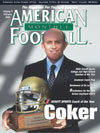AMERICAN FOOTBALL MONTHLY THE #1 RESOURCE FOR FOOTBALL COACHES
|
|
Article Categories
|
Everybody\'s All-AmericanLarry Coker brings class to college football and the swagger back to Miami by: Richard Scott© More from this issue
|
Coker's 24-Game
Winning Streak
2001 (12-0)
Miami 33, Penn State 7
Miami 61, Rutgers 0
Miami 43, Pittsburgh 21
Miami 38, Troy State 7
Miami 49, Florida State 27 (14)
Miami 45, West Virginia 3
Miami 38, Temple 0
Miami 18, Boston College 7
Miami 59, Syracuse 0 (14)
Miami 65, Washington 7 (12)
Miami 26, Virginia Tech 24 (14)
Rose Bo....The full article can only be seen by subscribers.
Subscribe today!

|
|
|
NOT A SUBSCRIBER?
Subscribe
now to start receiving our monthly magazine PLUS get INSTANT
unlimited access to over 4000 pages of 100 percent football coaching
information, ONLY available at AmericanFootballMonthly.com!
|
|
|
HOME
|
MAGAZINE
|
SUBSCRIBE
|
ONLINE COLUMNISTS
|
COACHING VIDEOS
|
Copyright 2026, AmericanFootballMonthly.com
All Rights Reserved
|






